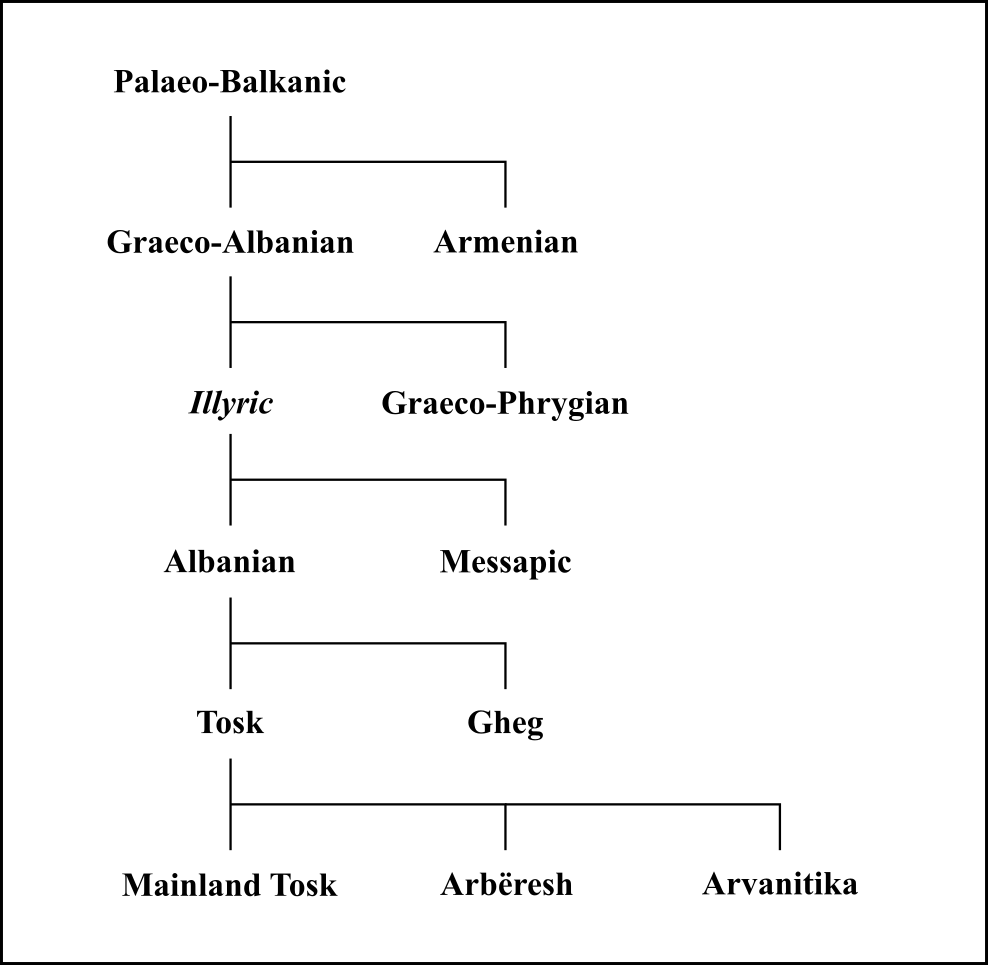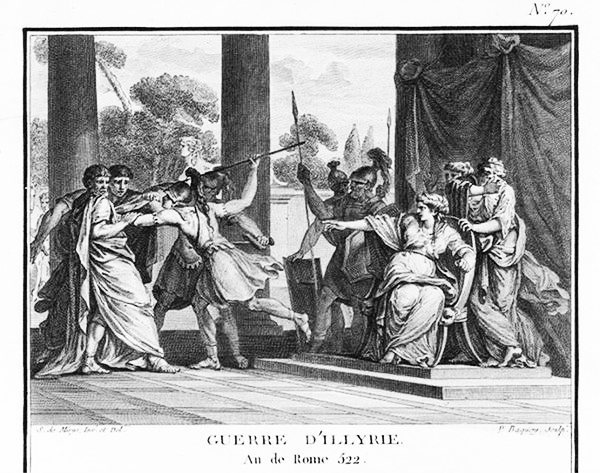|
Skerdilaidas
Scerdilaidas or Skerdilaid ( grc, Σκερδιλαΐδας; ruled 218206 BC) was an Illyrian ruler of the Illyrian kingdom under the Labeatan dynasty. Before taking the throne, Scerdilaidas was commander of the Illyrian armies and played a major role in the Illyrian Wars against the Romans. Scerdilaidas was one of the youngest brothers of Agron and father of Pleuratus III and grandfather of Gentius.Épire, Illyrie, Macédoine: mélanges offerts au professeur Pierre Cabanes by Danièle Berranger, Pierre Cabanes, Danièle Berranger-Auserve, page 133 Scerdilaidas took part in many expeditions in the Ionian and Aegean with Demetrius and his brother-in-law Amynas of Athamania. During his early reign Scerdilaidas was an ally of Rome. In 217 BC Scerdilaidas later adopted Roman rule and became an enemy of Macedonia for parleying with Rome. With the Romans invested by Hannibal, Philip V of Macedon sought to take southern Illyria from Scerdilaidas and made several advancements into the ... [...More Info...] [...Related Items...] OR: [Wikipedia] [Google] [Baidu] |
Illyrian Language
The Illyrian language () was an Indo-European language or group of languages spoken by the Illyrians in Southeast Europe during antiquity. The language is unattested with the exception of personal names and placenames. Just enough information can be drawn from these to allow the conclusion that it belonged to the Indo-European language family. In ancient sources, the term " Illyrian" is applied to a wide range of tribes settling in a large area of southeastern Europe, including Ardiaei, Autariatae, Delmatae, Dassareti, Enchelei, Labeatae, Pannonii, Parthini, Taulantii and others (see list of ancient tribes in Illyria). It is not known to what extent all of these tribes formed a homogeneous linguistic group, but the study of the attested eponyms has led to the identification of a linguistic core area in the south of this zone, roughly around what is now Albania and Montenegro, where Illyrian proper is believed to have been spoken. Little is known about the relationships betwee ... [...More Info...] [...Related Items...] OR: [Wikipedia] [Google] [Baidu] |
Livy
Titus Livius (; 59 BC – AD 17), known in English as Livy ( ), was a Ancient Rome, Roman historian. He wrote a monumental history of Rome and the Roman people, titled , covering the period from the earliest legends of Rome before the traditional founding in 753 BC through the reign of Augustus in Livy's own lifetime. He was on familiar terms with members of the Julio-Claudian dynasty and a friend of Augustus, whose young grandnephew, the future emperor Claudius, he exhorted to take up the writing of history. Life Livy was born in Patavium in northern Italy (Roman Empire), Italy, now modern Padua, probably in 59 BC. At the time of his birth, his home city of Patavium was the second wealthiest on the Italian peninsula, and the largest in the province of Cisalpine Gaul (northern Italy). Cisalpine Gaul was merged in Roman Italy, Italy proper during his lifetime and its inhabitants were given Roman citizenship by Julius Caesar. In his works, Livy often expressed his deep affection an ... [...More Info...] [...Related Items...] OR: [Wikipedia] [Google] [Baidu] |
Triteuta
Triteuta ( grc, Τριτεύτα; 230–219 BC) was an Illyrian queen and the first wife of the Illyrian king Agron of the Ardiaei (r. 250–231 BC), with whom she had a son named Pinnes. Sometime before his death (231/230 BC), Agron divorced Triteuta and married Teuta. Their son, crown prince Pinnes, was placed under the guardianship of step-mother Teuta (the Queen regent) until after the First Illyrian War (228 BC). According to Dio Chrysostom, Demetrius of Pharos Demetrius of Pharos (also Pharus) ( grc, Δημήτριος ἐκ Φάρου and Δημήτριος ὁ Φάριος) was a ruler of Pharos involved in the First Illyrian War, after which he ruled a portion of the Illyrian Adriatic coast on beha ... married Triteuta and became regent for Pinnes, after the war, thus becoming the most powerful of the Illyrian rulers in the 220s BC. References Sources * * * * {{Illyrians Illyrian queens 3rd-century BC women ... [...More Info...] [...Related Items...] OR: [Wikipedia] [Google] [Baidu] |
Pinnes
Pinnes ( grc-gre, Πίννης; also Pinnius; c. 230 – 217 BC) was the son of Agron, king of the Ardiaei in Illyria, and Agron's first wife Triteuta. He officially succeeded his father as king in 230 BC, but the Ardiaean kingdom was ruled by Agron's second wife, Queen Teuta. Biography Pinnes was only a young boy when his father died in 230 BC, and his stepmother Teuta assumed ''de facto'' control. Local chiefs demanded greater power and autonomy for their regions and Teuta, who feared losing her status, appeased the aggressors. This act was seen as a sign of weakness and no ship in the Adriatic and Ionian sea was safe from Illyrian pirates who raided regardless of a ship's country or the damage it would do to Illyria's foreign relations. Greece was the most affected by this new danger as their economy depended on the seas. Rome, wanting to protect trade routes between Magna Graecia and Greece, sent delegates to mediate the situation, but war broke out due to a disagreemen ... [...More Info...] [...Related Items...] OR: [Wikipedia] [Google] [Baidu] |
First Illyrian War
The Illyro-Roman Wars were a series of wars fought between the Roman Republic and the Ardiaei kingdom. In the ''First Illyrian War'', which lasted from 229 BC to 228 BC, Rome's concern was that the trade across the Adriatic Sea increased after the First Punic War at a time when Ardiaei power increased under queen Teuta. Attacks on trading vessels of Rome's Italic allies by Illyrian pirates and the death of a Roman envoy named Coruncanius on Teuta's orders,Zock, 99. prompted the Roman senate to dispatch a Roman army under the command of the consuls Lucius Postumius Albinus (consul 234 BC), Lucius Postumius Albinus and Gnaeus Fulvius Centumalus. Rome expelled Illyrians, Illyrian garrisons from a number of Greece, Greek cities including Epidamnus, Apollonia (Illyria), Apollonia, Korkyra (polis), Corcyra, Hvar, Pharos and established a protectorate over these Greek towns. The Ancient Rome, Romans also set up Demetrius of Pharos as a power in Illyria to counterbalance the power of Teuta.E ... [...More Info...] [...Related Items...] OR: [Wikipedia] [Google] [Baidu] |
Rome
, established_title = Founded , established_date = 753 BC , founder = King Romulus (legendary) , image_map = Map of comune of Rome (metropolitan city of Capital Rome, region Lazio, Italy).svg , map_caption = The territory of the ''comune'' (''Roma Capitale'', in red) inside the Metropolitan City of Rome (''Città Metropolitana di Roma'', in yellow). The white spot in the centre is Vatican City. , pushpin_map = Italy#Europe , pushpin_map_caption = Location within Italy##Location within Europe , pushpin_relief = yes , coordinates = , coor_pinpoint = , subdivision_type = Country , subdivision_name = Italy , subdivision_type2 = Region , subdivision_name2 = Lazio , subdivision_type3 = Metropolitan city , subdivision_name3 = Rome Capital , government_footnotes= , government_type = Strong Mayor–Council , leader_title2 = Legislature , leader_name2 = Capitoline Assemb ... [...More Info...] [...Related Items...] OR: [Wikipedia] [Google] [Baidu] |
Ioannina
Ioannina ( el, Ιωάννινα ' ), often called Yannena ( ' ) within Greece, is the capital and largest city of the Ioannina regional unit and of Epirus, an administrative region in north-western Greece. According to the 2011 census, the city population was 65,574, while the municipality had 112,486 inhabitants.GOV. results of permanent population 2011, p. 10571 (p. 97 of pdf), and in Excel formatTable of permanent population 2011 from the sitHellenic Statistical Authority 24 November 2017. Retrieved 2018-01-09. It lies at an elevation of approximately above sea level, on the western shore of |
Phoenice
Phoenice or Phoenike ( el, Φοινίκη) was an ancient Greek city in Epirus and capital of the Chaonians.: "To the north the Chaonians had expelled the Corcyraeans from their holdings on the mainland and built fortifications at Buthrotum, Kalivo and Kara-Ali-Bey; and they had a citadel at their political centre, Phoenice.". It was also the location of the Treaty of Phoenice which ended the First Macedonian War, as well as one of the wealthiest cities in Epirus until the Roman conquest.. During the early Byzantine period, Phoenice was the see of a bishopric. The city is an archaeological park of Albania and is located on a hill above a modern town which bears the same name, Finiq, in modern southern Albania. Toponym The toponym is ultimately of non-Indo-European origin, as with all names with an -īk suffix in IE languages. There were at least 16 toponyms throughout the Ancient Greek world sharing the root ''Phoinik-''; from Epirus to Lycia. In ancient Greek, φοῖνιξ ( ... [...More Info...] [...Related Items...] OR: [Wikipedia] [Google] [Baidu] |
Antigonia (Chaonia)
Antigonea (), also transliterated as Antigonia and Antigoneia, was an ancient Greek city in Chaonia, Epirus, and the chief inland city of the ancient Chaonians. It was founded in the 3rd century BC by Pyrrhus of Epirus, who named it after one of his wives, Antigone, daughter of Berenice I and step-daughter of Ptolemy I of Egypt. History "The straits near Antigoneia" were mentioned in 230 BC, when a force of Illyrians under Scerdilaidas passed the city to join an invading army further south. In 198 BC, during the Second Macedonian War, the Romans marched against the Macedonian armies of Philip V. His general, Athenagoras, was able to occupy one of the nearby passes, leading to the Romans being held back. Initially the Romans were going to negotiate peace, however, several treasonous shepherds led the Romans to be able to surround and destroy the Macedonian army of 2000 men. The inhabitants of Antigoneia had sided with the Macedonians and so when the Romans were victorious over th ... [...More Info...] [...Related Items...] OR: [Wikipedia] [Google] [Baidu] |
Battle Of Phoenice
The Battle of Phoenice was a battle that took place in 230 BC between the forces of the Epirote League and the Ardiaean Kingdom of Illyria. Illyrian Invasion of Epirus and Battle Phoenice had been previously taken by Illyrians acting under Queen Teuta, in 230 BC, after a Gaulish garrison of 800 men surrendered to the larger Illyrian force. In reaction, the Epirote League sent in an army to retake Phoenice. They took up positions at a river outside of Phoenice. Meanwhile, 5,000 Illyrians under Scerdilaidas had advanced inland into Epirus from Southern Illyria and reached a pass just outside Antigoneia. The Epirotes reacted by dividing their army, sending a small detachment to protect Antigoneia whilst keeping their main body outside of Phoenice. The Illyrians at Phoenice, seeing the Epirote army was divided, advanced towards their camp and crossed the river. The next day, the forces engaged each other in battle. The Epirote forces were routed and badly defeated, with many being ... [...More Info...] [...Related Items...] OR: [Wikipedia] [Google] [Baidu] |
Teuta
Teuta (Illyrian languages, Illyrian: *''Teutana'', 'mistress of the people, queen'; grc, Τεύτα; lat, Teuta) was the queen regent of the Ardiaei tribe in Illyria, who reigned approximately from 231 BC to 228/227 BC. Following the death of her spouse Agron of Illyria, Agron in 231 BC, she assumed the regency of the Ardiaean Kingdom for her stepson Pinnes (Ardiaean), Pinnes, continuing Agron's policy of expansion in the Adriatic Sea, in the context of an ongoing conflict with the Roman Republic regarding the effects of Illyrian warfare, Illyrian piracy on regional trade. The death of one of the Roman ambassadors at the hands of Illyrian pirates gave Rome the occasion to declare war against her in 229 BC. She surrendered after losing the First Illyrian War in 228. Teuta had to relinquish the southern parts of her territory and pay a tribute to Rome, but was eventually allowed to keep a realm confined to an area north of Lissus (Illyria), Lissus (modern Lezhë). Biographical ... [...More Info...] [...Related Items...] OR: [Wikipedia] [Google] [Baidu] |






